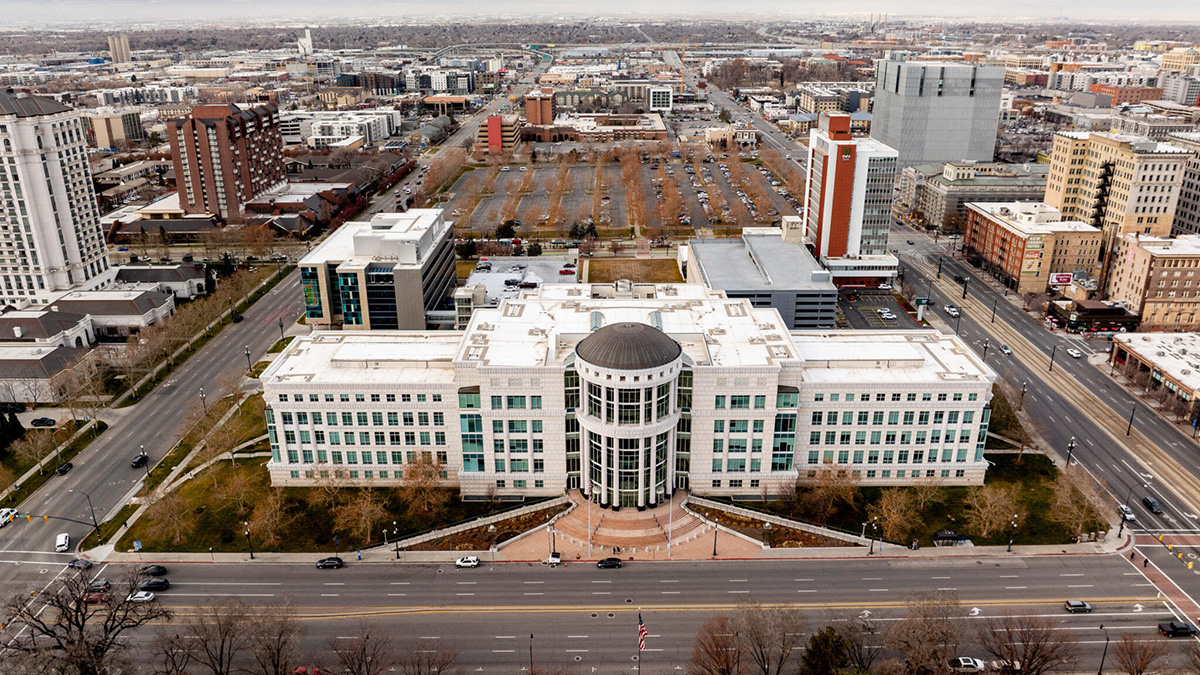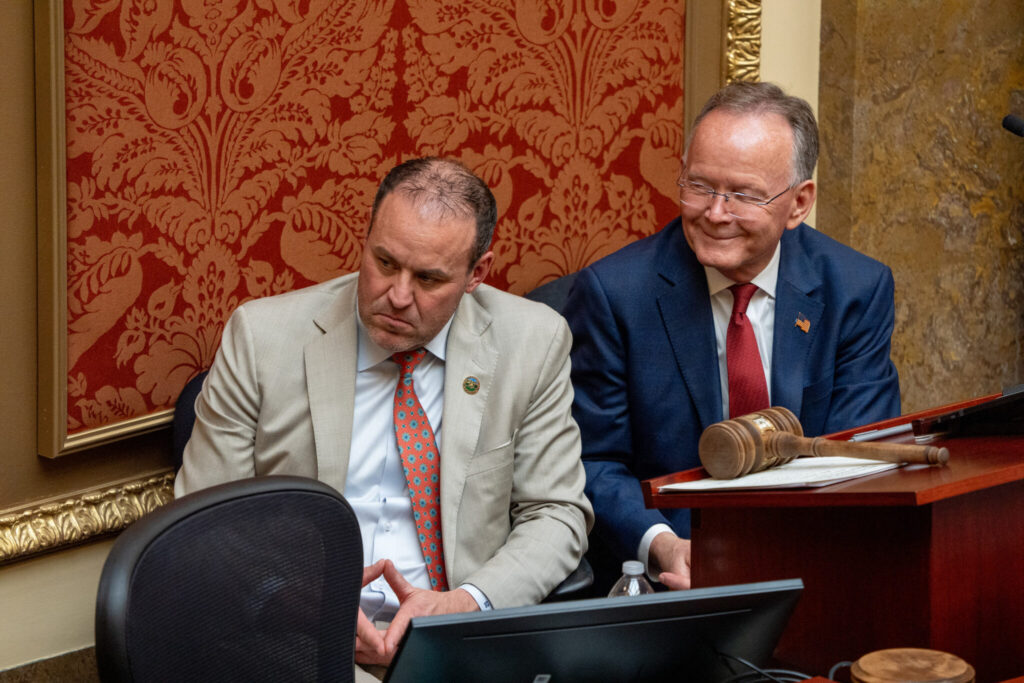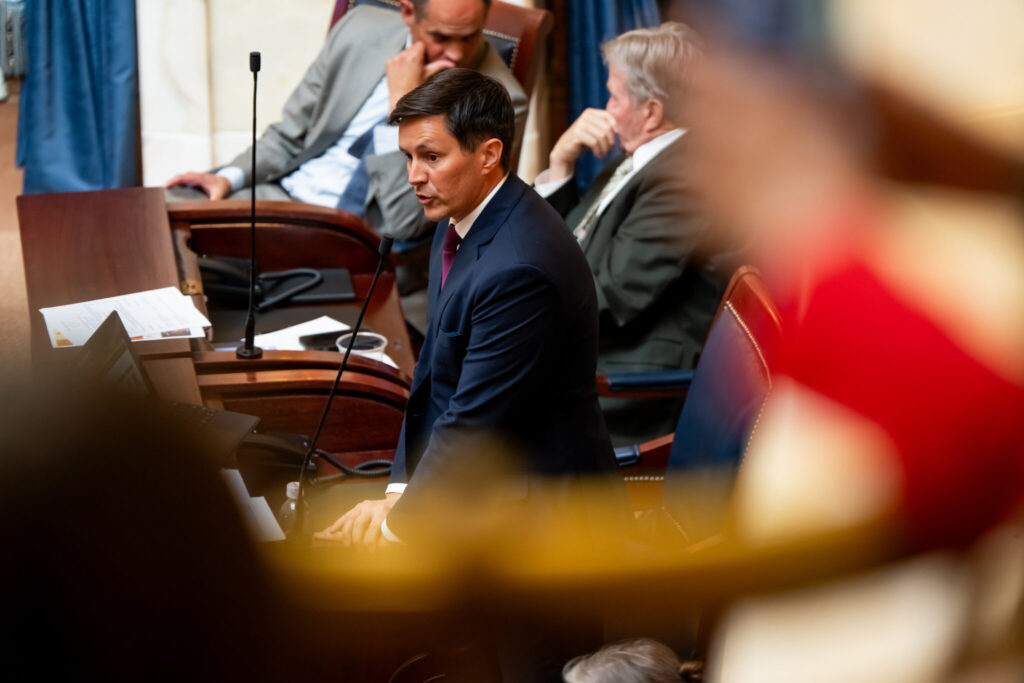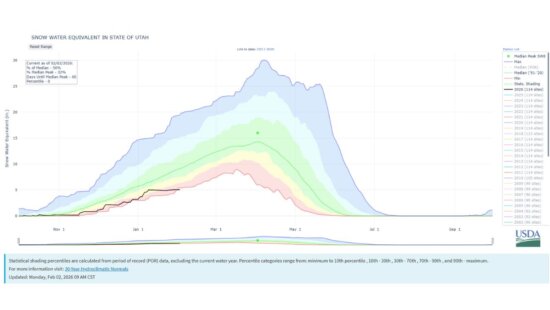Politics
‘Revenge streak’: Utah Bar opposes flurry of bills flexing legislative influence on judiciary

The Matheson Courthouse in Salt Lake City is pictured on Wednesday, January 3, 2024. Photo: Spenser Heaps for Utah News Dispatch
Utah lawmakers pushing changes to the judiciary argue they’re meant to make the courts ‘closer to the people,’ while Bar Association worries they’ll ‘undermine’ the judiciary, disrupt balance of powers
Written by Katie McKellar, for Utah News Dispatch
SALT LAKE CITY, Utah – A dizzying number of bills aimed at altering the rules governing Utah’s judicial branch keep cropping up during the Utah Legislature’s 2025 legislative session.
Elizabeth Wright, executive director of the Utah State Bar, said even she has had a hard time keeping up with all of them.
“It’s just been … overwhelming,” Wright told Utah News Dispatch this week. “Every day, new legislation is coming out that is attacking the independence of the judiciary.”
Wright said it’s no “secret” that the Republican-controlled 2025 Utah Legislature would have the judiciary in its crosshairs.
“Legislators have been very open with the Bar about the fact that they are displeased with the judiciary, specifically because of rulings that came down this summer,” Wright said. “Sadly, from my perspective as a lawyer and a citizen, they appear to be on a bit of a revenge streak.”
Legislative leaders deny that the bills are meant to be an act of “revenge,” but rather they’re part of an effort to make the judicial branch more transparent and responsive to Utahns.
“I wholeheartedly disagree,” House Speaker Mike Schultz, R-Hooper, told reporters Thursday, though he also argued its “fully within the Legislature’s purview” to set rules and policy regarding not just the judicial branch but also the executive branch in certain circumstances.
But the bills do unmistakably come after a summer of at least two high-profile court rulings that riled lawmakers.

First, there was the unanimous Utah Supreme Court opinion issued July 11 that sent the League of Women Voters of Utah’s anti-gerrymandering lawsuit back to district court, ruling the judge “erred” in dismissing the claim that the Legislature violated the Utah Constitution when it repealed and replaced a 2018 voter-approved ballot initiative that sought to enact an independent redistricting commission.
Utah’s Republican legislative leaders reacted with dismay, saying it effectively made a “new law about the initiative power, creating chaos and striking at the very heart of our Republic.” On the first day of the 2025 legislative session, Utah Senate President Stuart Adams, R-Layton, called on lawmakers to act, saying, “We will not let initiatives driven by out-of-state money turn Utah into California.”
There was also the 4-1 Utah Supreme Court opinion issued Aug. 1, that upheld an injunction blocking enforcement of Utah’s 2020 near-total abortion ban that lawmakers had hoped would take effect once Roe v. Wade was overturned in 2022. But after Planned Parenthood of Utah sued and successfully sought an injunction while the court case plays out, abortions in Utah have remained legal up until 18 weeks of gestation.
Republican lawmakers were rattled, with one, Rep. Jordan Teuscher, R-South Jordan, at the time saying in a now-deleted post on X it was “disheartening” to see Utah’s anti-abortion “legacy” be “disregarded by an activist court stretching to reach its opinion.”
Soon after, Schultz was open about the likelihood that lawmakers would bring legislation aimed at the courts. He cited growing “frustrations” among conservatives that the state’s judges are “disconnected” from Utahns.
“Everything’s on the table right now,” Schultz said at the time. “Moving the judiciary closer to the people is a trend that’s happening nationwide. And, you know, it’s starting to percolate here in Utah.”
Percolate it has.
With about two weeks remaining in the session, at least eight bills have surfaced that have raised red flags from the Utah State Bar, an organization for Utah’s 12,000 lawyers and judges that was established by the Utah Supreme Court to regulate the practice of law in the state.
The Utah State Bar Commission on Wednesday issued a lengthy news release saying the Bar is “holding firm on its opposition to legislation that jeopardizes judicial independence enshrined in the state constitution.”
It’s too soon to say which bills will become law during the 2025 Utah Legislature. But depending on which ones do, Wright said it’s possible they could result in further litigation or “constitutional challenges.”
Bills opposed by the Bar
HB512, one that the Bar called “particularly troubling,” is being sponsored by House Majority Whip Karianne Lisonbee, R-Clearfield. It would create a new body — called the Joint Legislative Committee on Judicial Performance, made up of appointed lawmakers — that could potentially override the existing Judicial Performance Evaluation Commission.
“The concerns expressed by many licensees and our Government Relations Committee is this new entity comprised of only legislators will inject politics into the current merit-based and nonpartisan judicial evaluation and retention process,” the Bar wrote.
Under HB512, the new legislative committee could request a judge’s disciplinary record from the Judicial Conduct Commission and may investigate “any issue raised by a member of the committee, the Legislature, or a member of the public,” according to the bill.
“This broad mandate means that any issue, even a disagreement with a judge’s legal ruling, could trigger an evaluation, regardless of whether there is credible evidence of judicial misconduct or incompetence,” the Bar said.
After conducting an evaluation, the legislative committee created by HB512 could then vote to recommend that a judge not be retained. The Bar said the bill doesn’t contain a clear definition of “judicial performance,” meaning the committee could make the decision based on “nearly any subjective factor, such as a lawmaker’s disagreement with a judge’s rulings.”
That recommendation would then appear on the ballot, “potentially influencing voters to reject a judge based on subjective opinions and not objective legal standards,” the Bar said.
“The process is demeaning and of questionable constitutionality,” the Bar said. “Requiring a judge to answer to a legislative body goes against the core principle of our constitution – a judiciary that can make decisions based on the facts and law without fear of being pilloried in public or removed from the bench.”
As of Thursday, HB512 had not yet received a committee hearing.
Lisonbee, in a prepared statement, defended her bill as a means to provide more information to voters during judicial retention elections. Every election, she said, “voters tell us they don’t have enough information to make an informed decision.”
“While the Judicial Performance Evaluation Commission (JPEC) was created to help address this gap, many Utahns still feel they don’t have enough information about how to vote,” Lisonbee said.
Lisonbee acknowledged that when a judge is appointed, the Utah Senate votes to consent to the appointment. Lisonbee said HB512 “builds on that work” by creating the legislative committee that can hold public hearings and offer a recommendation on the ballot.
“The bill strengthens transparency and gives voters more information for making these important decisions at the ballot box,” Lisonbeen said.
But Wright said Lisonbee’s bill must also be read alongside another, HB412, which she said together will “inject” partisan politics into the judicial retention process.

HB412, sponsored by Rep. Jefferson Burton, R-Salem, would remove the requirement that no more than half of the appointed members on JPEC and the Elected Official and Judicial Compensation Committee be from the same political party. That would effectively “remove the long-standing nature of non-partisanship on these boards,” the Bar said.
On Thursday, HB412 cleared its first legislative hurdle after the House Government Operations Committee endorsed it on a 8-3 vote.
HB451, sponsored by Rep. Jason Kyle, R-Huntsville, would require a justice or judge to receive at least 67% of the vote to be retained in office, up from a simple majority.
“This increased percentage vote would be the highest in the nation,” the Bar said in a document issued last week listing the bills it opposes, warning it would make it difficult for the state to attract and keep qualified judges and “allow outside and special interests to campaign against judges when they only have to convince one-third of the populace to vote against a judge.”The bar added there is “no need to change what is a very successful and nationally recognized judicial process.”
Through a House spokesperson, Kyle did not return a request for comment this week. However, Republican Senate leaders told reporters his bill isn’t likely to make it across the legislative finish line. It hasn’t yet received a committee hearing.
Senate Majority Leader Kirk Cullimore, R-Sandy, who is also an attorney, told reporters earlier this month, “I’m not sure (requiring a two-thirds majority) passes constitutional muster” to elect judges. On Thursday, Cullimore said that bill “probably doesn’t have a lot of legs, at least in this session.”
SB145, sponsored by Sen. Brady Brammer, R-Highland, is also opposed by the Bar, and on Tuesday it won unanimous endorsement from a Senate committee. Alongside SJR4, the Bar said the resolution and bill “work together to grant legislative auditors the authority to require the production of privileged information or information prepared in anticipation of litigation from individuals or entities subject to audit by the legislative auditor.”
“This legislation attempts to govern the practice of law by altering the nature of the attorney-client privilege and the ability for a government client to rely on the confidentiality of the communications with their counsel,” the Bar said.
SB203, also sponsored by Brammer, could also make it harder for Utahns to challenge laws passed by the Utah Legislature by restricting who would be eligible for third-party standing to bring civil actions against the state.
“This bill attempts to change long-standing common law principles of standing,” the Bar said, explaining why it opposes it.
SB203 won approval from the Senate on Thursday, on a 22-7 vote. It now goes to the House for consideration.
The Bar also previously opposed an earlier version of another bill sponsored by Brammer, SB204, that would have raised the bar for the courts to issue injunctions to block laws being challenged in court as unconstitutional. Previously, SB204 would have created a “suspensive appeal” process for government defendants, allowing them to appeal an injunction straight to the Utah Supreme Court and the law wouldn’t be enjoined during as the court case played out.
However, now the Bar says it’s “neutral” on SB204, after Brammer changed his law to take out the “suspensive appeal” and more simply allow a defendant the right to appeal an injunction in a civil action if the underlying claim is that the state law is unconstitutional on its face. That bill also cleared the Senate on Thursday, on a 20-6 vote.
Brammer, in a committee hearing arguing in favor of SB204, said he believes courts have been “getting in the way of democracy” by too often and easily blocking laws from taking effect.
SJR9, also sponsored by Brammer, continues to concern the Bar. That bill would amend the Utah Rules of Civil Procedure to give an applicant only 28 days after the conclusion of a legislative session to file a motion for a restraining order or preliminary injunction against a law. The resolution would be “inconsistent” with SB204, the Bar said, though it added it’s working with Brammer to address issues with the legislation.
Those are the bills that the Bar has so far taken a position on, but there could be others as they make their way through the Legislature.
Proposed changes to the Utah Supreme Court
On Wednesday, SB296, sponsored by Sen. Chris Wilson, R-Logan, went public. It would change how Utah’s Supreme Court chief justice and the presiding judge over the Court of Appeals gets picked.
Rather than the Supreme Court justices electing their chief justice, under SB296, the governor would make the appointment, subject to a confirmation hearing in the Senate. And rather than judges in the Court of Appeals electing a presiding judge, the governor (with advice and consent from the Senate) would make the appointment.
Wilson told reporters Wednesday he wants to “align” Utah’s chief justice selection process with the federal U.S. Supreme Court Justice selection process. “We think this will be a good way for our constituents, the citizens, to be able to weigh in on that process,” he said.
Additionally, House Majority Leader Jefferson Moss, R-Saratoga Springs, has opened a bill file titled “Judicial Office Modifications.” While the bill is still being drafted and isn’t public, Moss said in a prepared statement he’s looking to potentially expand the five-member Utah Supreme Court.
“Over the past decade, we have seen growing caseloads, delays, and evolving legal complexities in Utah’s highest court,” Moss said. “The Legislature has the ability to adjust the court’s size in response to these growing demands. As such, I’ve opened a bill file to explore the potential of adjusting the number of justices on the Utah Supreme Court.”
Moss told reporters Thursday that he’s still working on the bill — and he hasn’t yet settled on a number to expand the Utah Supreme Court, whether it’s five or seven justices. Schultz acknowledged it’s getting “a little late” in the session for that bill, so it may be one that lawmakers “continue discussing” next year — but he likes the idea.
“As issues before the Supreme Court become more complex, I think having more eyes on that is a good thing,” the House speaker said.
Asked about Wilson and Moss’ bills Wednesday, Wright said she hadn’t had a chance to look at them, but, again, “it appears to me to be an attempt to fashion a judiciary that can’t and won’t rule against them.”



















